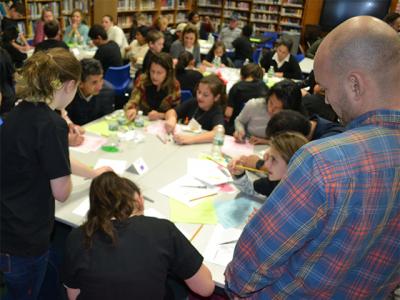Living History Comes to the Springs School

The sixth to eighth-grade student “ambassadors” who will participate in the Springs School’s second annual Diversity Institute may be astonished to learn they are no older right now than Thursday’s featured speaker, Judy Sleed, was when Nazi soldiers arrived in Budapest in March of 1944 and took away her father and only brother, and then before long her mother, too.
She was 12 and never spoke to them again.
Mrs. Sleed, who is now 86, has a remarkable story of surviving the Holocaust and immigrating to America that touches on nearly every theme the Diversity Institute hopes to convey to the 100 students and parents who are expected to attend from 6 to 8 p.m. in the Springs School gym.
The diversity ambassadors are described on their school webpage as “a student-driven task force that promotes cultural tolerance and peace by raising awareness of the devastating effects of bias and hate. . . . In our schools, intolerance manifests as bullying, harassment, and violence. Research shows that young people who are victims of intolerance are more likely to hurt themselves or others. History teaches us that when left unchallenged, bias and discrimination can escalate into hate crimes and even genocide.”
Mrs. Sleed can speak to all of that.
When Nazi soldiers came in October 1944 to a “yellow house” where she had been sent — it was called that because Jews had to put a yellow Star of David outside places they were living, as well as on their clothing, she said — Mrs. Sleed was among a group that was rounded up and marched on foot across Budapest to a holding spot. In the chaos after they all arrived, Mrs. Sleed saw an open door and slipped out into the street unnoticed — then walked away.
She knew her way around the city “a little” and spent most of that first night walking, finally choosing to sleep outside the house of a family friend who never arrived back home. In the morning, she resumed walking and searching for other Jewish families she knew and again came upon empty house after empty house. She finally made it to the home of an aunt who had avoided the Nazi sweeps by paying for false papers on the black market that said she was not Jewish.
Locating her brought Mrs. Sleed’s second lifesaving stroke of luck: Her aunt got her spirited into a Swiss-run safe house where she stayed out of the reach of the Nazis until the liberation of Hungary. She came to America shortly before her 16th birthday to live with one of her father’s 11 siblings. She eventually married Joel Sleed, the late Long Island Press newspaperman. One of their three children, Jeff, plans to be in the crowd to hear his mother speak.
For the Springs School’s original 24 student ambassadors, hearing Mrs. Sleed will culminate a year of varied learning experiences that they have been urged to pass on by mentoring the new students coming into the program.
Building off last year’s inaugural Diversity Institute night, the school’s assistant principal, Christine Cleary, who heads up the program, organized other activities throughout the year such as a United Nations trip to learn more about peacekeeping missions, diplomacy, and conflict resolution. The students had an opportunity to read books with social justice and human rights themes. They learned communication skills and ways to intervene if they see other students engaging in bad behavior.
The student-ambassadors also planned most of tonight’s program, which will also touch on topics such as culture and identity and present opportunities for their parents to participate.
Mrs. Sleed said when the Diversity Institute was described to her, she told Ms. Cleary, “I’ll do anything to help.”
Mrs. Sleed said it’s been less than a decade since she felt comfortable even telling anyone she was a Holocaust survivor because of the pain it conjures up. But she’s since written a play called “Delibab” about her teenage experiences, as well as a children’s book called “The Fight of the Crayons” that advocates “you have to be equally nice to everyone in this world” regardless of differences.
She plans to mention both works during her talk.
